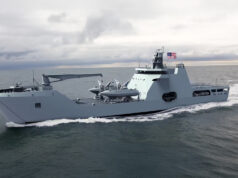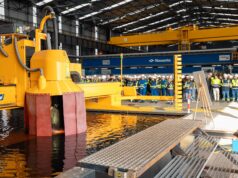Trade union Unite confirmed today that over 30 members contracted to work on the new Type 26 Frigates on the Clyde are set for strike action in the new year.
The Unite members involved in the pay dispute are employed by CBL Cable Contractors Limited based at the BAE Systems Govan and Scotstoun shipyards on the Clyde.
In short, the issue is that around 30 workers are paid £1 less per hour than others at the yard who are on the BAE Systems yard rate. The workers include electricians, labourers and cable hands.
“The strike action will occur over multiple days starting on 10 January and ending 27 March 2024. In November, the CBL Cable workers indicated their anger over the pay dispute by emphatically backing strike action by 100 per cent on an 88 per cent turnout.
The contractors are demanding to be paid the BAE Systems yard rate, or an additional £1 per hour on top of the current rates of pay. The dispute also involves travel related payments which Unite’s members are due as the Clyde shipyards falls under the scope of the Joint Industry Board Agreement.”
Unite general secretary Sharon Graham said:
“The CBL Cable workers are fully entitled to equal treatment at the Govan and Scotstoun yards. The company should stop paying lip service to the national agreement and immediately start paying the rate. Our members have their union’s full support in the fight for better jobs, pay and conditions.”
The Joint Industry Board Agreement sets the standards for employment, grading and apprentice training in the electrical contracting industry. This includes travel time and the use of a personal vehicle to travel to work which entitles workers to a mileage allowance.
Stevie Dillon, Unite regional coordinator, added:
“CBL Cable workers are fully prepared to go on strike to get the ‘shipyard rate’. They shouldn’t need to go on strike to get what they are owed, but make no mistake, they are fully prepared to fight for what they should be automatically getting. We would urge CBL Cable Contractors and BAE Systems to get back round the table to resolve this dispute before it further escalates.”
The strike dates are 10,17, 22, 24, 29 and 31 January. 5, 7, 12, 14, 19, 21, 26 and 28 February. 4, 6, 11, 13, 18, 20, 25, and 27 March. All strikes are between 07:00 – 17:00.














This seems like a pretty easy to fix issue.
Yes pretty easy to fix, but would require renegotiation of the BAE – CBL Contract. At the some time if you were a worker that wanted to join BAE and get their rates should have applied to BAE not CBL to work. What about the other CBL contractors that don’t work on a BAE site but on something else? Do they get an uplift? where does it end – What happens when you stop working on the BAE contract do you get a reduction in salary? if you work for a contractor/consultancy rate doesn’t change per client, just the way it is. It is not great but it means you are more likely to have a job and work elsewhere when BAE are done with work and don’t get made redundant so that is part of the equation too. Simple but not, 2/3 side to every story here 🙂
Interestingly I do some contract work and my rates very much change on the contractor, I negotiate what my day rate will be depending on the job at hand and how desperate they are for my skill set. In reality and especially with contract work it’s as much about hard nosed market forces as it is about employee relations….if those workers want to look BAE,CBL in the eyes and say we want more go for our marketable skill set go for it…that’s what CBL does to BAE, and what BAE does to the taxpayer ( via the government).
Yes absolutely you can negotiate a different rate and I am sure CBL will have one rate for BAE and a different rate for someone else. But what they pay their employees will not change from client to client. CBL’s margin will be different and some accounts are more some less. If there is not enough margin and the company doesn’t make a profit at some point it will fold and then all jobs go (see UK manufacturing industry in general). BAE could potentially go to someone else for this work and then what happens to the 30 or so people? Ultimately as an employee you can walk and find a job directly with BAE (negotiate your own rate or go elsewhere). Unions can do a lot of good but can also do a lot of damage at the same time. If CBL negotiate a higher rate for their BAE site employees then the rest of their work force may say why not me and then if you do that may not be a company anymore. Capitalism eh! 🙂
Now that it’s interesting because the talent company I have been signed up with in the past works differently…when I do interim work ( I tend to interim if I’m between jobs and my main employer has irritated me to the point I need a rest and leave) the talent company negotiates my pay specifically on what it thinks it can get for me and what I want money wise for a specific job..I can then turn it down or not..we essentially work together to get what I think is reasonable renunciation for the job, and they then get paid for fulfilling that post..but one of the key things is that they need to get me Maximum money or I won’t do the job…different business model I suppose.
And in doing so torpedo the whole point of competitively rendering work packages……so costs aren’t ground down.
But that is rather the unions point – they want fixed yard rates and retained workforce – old style.
Welcome back to costs plus contracts.
ATM it is a strange time to be crystallising this dispute as there is starting g to be slack in construction workforce and costs a generally stable or marginally declining.
You do make some valid points but to be clear CBLs contract with BAE states they must pay the yard rate or above. This clause was also clearly stated in the bid process and on award of the contract
I am also not sure how many individual get transferred to other CBLs jobs but you are correct they would need to change their rate to match that contract terms, this is contracting
Yes, let’s move all warship building back south of the border where 90% of the finance comes from. Or to Poland where they will do it for half the cost…
The NE never had Union problems and the yards all closed
And that right there was the problem.
Just a thought if they are employed by CBL who are subcontracted to BAE, the problem is with CBL nothing to do with BAE.
Seriously guys, this is petty stuff! Pay them their £1 hour more as it makes such a big difference… and move on please…For Frigates Sake! Can’t believe this…only in the 🇬🇧 lol 😁
Doing their part to defend the nation.
This should be relatively easy to fix but underlying this dispute it worries me, about two things: 1. Cable contractors. 2. Monopoly of Scottish shipbuilders doing Government work.
Cables in ships have been reported in the news on two significant occasions on the Clyde.
First off was the saga of incorrect cabling at Fergusons with the Calmac Ferries.
Second was the reported sabotage of cabling already on HMS Glasgow.
What do we think about this and how can it be resolved?
when does shw and venturer float?